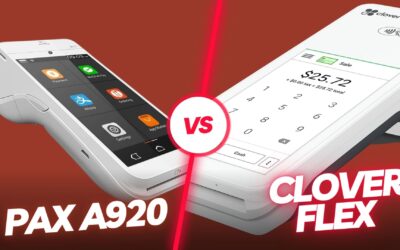
Complete Guide to Quantic POS in Alabama: Benefits, Setup, and Local Fit
Written by: Zac Rogers
Quantic POS in Alabama helps businesses streamline sales, manage staff, and integrate payments across locations with cloud-powered tools.
In the modern digital commerce landscape, businesses across Alabama — from Birmingham eateries to mobile food trucks in Huntsville — demand robust technology to stay competitive. Quantic POS is a cloud-based point-of-sale (POS) platform designed to meet the complex needs of restaurants, retail stores, cafés, bars, and specialty businesses. With its features, flexibility, and multi-device compatibility, Quantic POS offers a unified solution to streamline operations and drive growth. In this review, we’ll dig into Quantic’s strengths, weaknesses, pricing, real user feedback, and how well it fits the needs of Alabama-area merchants.
What Is Quantic POS?
Quantic POS is a cloud-native point-of-sale solution that runs on iOS and Android devices, enabling merchants to manage their entire business — sales, inventory, employees, customers, and reporting — from a unified dashboard.
Quantic positions itself as processor-agnostic, meaning businesses can choose or switch payment processing service providers rather than being locked into one. It also offers modules and hardware add-ons like kitchen display systems (KDS), customer-facing screens (CDS), and self-order kiosks.
Because Alabama has both urban and rural markets, Quantic’s cloud architecture and offline mode (for temporary connectivity loss) can help businesses operate reliably even in less-stable network zones.
Key Features of Quantic POS
Here’s a breakdown of the core features that make Quantic a contender among modern POS platforms.
1. All-in-One Business Management
- Inventory & Stock Control: Real-time inventory updates, low-stock alerts, purchase order integrations, and supplier management.
- Employee & Role Management: Set access levels by role, manage shifts, track staff performance, and monitor sales by employee.
- Customer Management (CRM & Loyalty): Store customer profiles, purchase histories, loyalty points, and tailor promotions.
- Reporting & Analytics: Dashboards and custom reports help track sales trends, product performance, margins, and more.
- Omni-channel Integration: Sync online and in-store sales, manage e-commerce channels, click & collect, and unify inventory.
2. Restaurant & Food Service Features
Quantic includes restaurant-specific capabilities to suit full-service and quick-service environments:
- Table & Floor Plan Management
- Coursing & Course Management
- Bar Tabs & Pre-authorizations
- Order splitting, modifiers, combo pricing
- Kitchen Display System (KDS) to streamline kitchen operations
- Delivery integrations & online order printing
- Self-order kiosks and customer-facing displays
These make it viable for sit-down restaurants in Alabama that need to manage table service flow, course pacing, and kitchen coordination.
3. Retail & Specialty Business Support
For retail operations — boutiques, convenience stores, specialty shops — Quantic provides:
- Barcode scanning, UPC item tracking
- Product variations (size, color, weight)
- Gift cards, store credits, coupons
- Vendor and purchase order management
- Customer loyalty & house accounts
- Multi-location inventory sync
For niche businesses like vape shops, delis, or bagel shops that carry regulated inventory or specialized SKUs, Quantic’s customizable modules are a plus.
4. Payment & Pricing Flexibility
- Supports credit/debit cards, contactless (NFC), mobile wallets (Apple Pay, Google Pay, Samsung Pay)
- Cash discount and dual-pricing options allow businesses to set separate prices for cash vs card to offset processing fees.
- No required binding contracts or hidden fees — though always confirm with the vendor.
5. Hardware & Add-Ons
- Kitchen Display System (KDS)
- Customer Display Screens (CDS)
- Self-Ordering Kiosks
- Smart Payment Terminals / POS hardware
These hardware elements help modernize the checkout and ordering experience.
What Users Are Saying — Pros & Challenges
Strengths & Positive Feedback
- Many praise Quantic’s clean interface, intuitive navigation, and relatively short staff learning curve.
- The offline-first capability ensures operations remain active even when connectivity is lost temporarily.
- The ability to choose or switch payment processors is a plus for flexibility.
- 24/7 support is promoted, which is critical for restaurant/retail operations with long hours.
Reported Issues & Cautions
- A restaurant employee reported bugs such as random time zone changes, problems with tip entry when splitting payments, and tab-splitting issues.
- Some users feel that reporting capabilities, while solid, could be deeper or more sophisticated.
- Pricing details are rarely published transparently, so businesses need to request quotes.
- Because Quantic is a relatively newer provider compared to giants like Toast or Clover, the ecosystem of third-party integrations or developer support might be smaller.
How Quantic Compares to Alternatives
|
Feature |
Quantic |
Toast / TouchBistro / Clover |
|
Runs on iOS & Android |
✅ |
Some are iOS-only or hardware-locked |
|
Processor-agnostic |
✅ |
Many are tied to specific processors |
|
Dual-pricing / cash discount |
✅ |
Rare or unavailable in many systems |
|
Retail + Restaurant verticals |
✅ |
Many specialize in one or the other |
|
24/7 Support |
✅ |
Varies (not always 24/7) |
Thus, for Alabama businesses looking for a flexible POS platform that can handle both restaurant and retail operations under one roof, Quantic is positioned well — assuming you validate real-world performance locally.
Is Quantic POS a Good Fit for Alabama Businesses?
Here are some Alabama-specific considerations:
- Connectivity Challenges
In some parts of rural Alabama, internet connectivity may be intermittent. Quantic’s offline mode is a significant benefit in such cases. - Local Sales Taxes & Compliance
Alabama has its state sales tax plus county/city additions. You’ll need a system that handles tax zones, item-level tax settings, and periodic adjustments. - Integration with Local Payment Processors
While Quantic claims processor-agnostic flexibility, confirm if it supports local merchant account providers or banks in Alabama. - Service & Hardware Support
The proximity of hardware support, spare parts, and service techs matters. If Quantic has regional partners or resellers in Alabama, your setup and maintenance will be smoother. - Multi-Store Chains
If you operate more than one location (e.g. in Birmingham and Montgomery), Quantic’s multi-location inventory and synchronization support is a selling point. - Restaurant Challenge Seasonality
In high demand periods (football gamedays, festivals in Tuscaloosa, Gulf Coast tourism), system stability is critical. Any bugs like time zone glitches or split-check errors must be vetted in pilot setups.
Implementation Tips & Best Practices
- Pilot testing: Before rolling out across your entire operation, run Quantic in one location or during off-peak hours to identify issues.
- Staff training & role configuration: Invest in training and set appropriate access levels from day one to avoid confusion or errors.
- Back up your data: Even though it’s cloud-based, periodically export critical reports and settings.
- Monitor logs and feedback: Watch for bug reports and have a direct support path.
- Negotiate a clear SLA: Ensure support response times, software update schedules, and uptime guarantees are spelled out in your contract.
Conclusion & Recommendation
Quantic POS offers a compelling feature set that bridges restaurant and retail needs under one platform. Its strengths — such as iOS/Android compatibility, offline mode, dual-pricing flexibility, and broad hardware integration — make it a strong candidate for many businesses in Alabama. However, it’s not without risks: reported software quirks and limited public pricing transparency mean you must evaluate carefully.
If your business demands flexibility, you have variable operations (retail + food), and you can test and validate early, Quantic POS merits serious consideration. For very large operations or those needing deep integrations with local banking/payment services, you might want to benchmark Quantic against established players before commitment.
FAQs: Quantic POS (for Alabama / U.S. Users)
Q1: What does “processor-agnostic” mean for me in Alabama?
It means Quantic doesn’t force you to use a specific payment processor. You should be able to connect your merchant account provider so long as Quantic supports their integration or API.
Q2: Does Quantic work offline when internet goes down?
Yes — Quantic is designed with an offline-first capability. Transactions and operations continue, then sync once the connection restores.
Q3: Are there hidden or long-term contracts?
Quantic markets itself as avoiding binding contracts or hidden fees, but you must review any quote or service agreement carefully to confirm.
Q4: What are dual-pricing and cash discounts?
- Cash Discount: Automatically gives a small discount if the customer pays in cash.
- Dual Pricing: Catalog shows both cash price and card price, with the card price built-in to cover processing costs.
Q5: How does Quantic compare to Toast or Clover?
Quantic offers some flexibility and vertical breadth (retail + restaurant) beyond what certain competitors provide. But top-tier competition may have more mature integrations or broader ecosystems.
Q6: Will it support multi-location management?
Yes — Quantic supports synchronization of inventory, pricing, customers and reports across multiple locations.
Subscribe
Winning with PayWavez
Our Blog
Unlock 2026’s Fastest Cash Advance with PayWavez
Written by: Zac Rogers Need a fast cash advance? Get flexible business funding with no long bank delays. Apply online and access capital quickly.In January 2026's credit crunch (6.75% prime rates, 40% bank rejections), traditional loans crushed SMBs demanding 625+...
Business Loans for Small and Medium Businesses in 2026
Written by: Zac Rogers Explore flexible business loans with fast approvals, transparent terms, and funding based on real cash flow. Grow your business with confidence in 2026.In 2026, most “business loan” approvals come down to one simple question: Can your business...
PAX A920 vs Clover Flex: The Ultimate 2026 Auto Shop POS Guide
Written by: Zac Rogers Upgrade your business with a modern auto shop POS. Perfect for repair shops, tire stores, and service centers across the USA.This guide is for auto shop POS and tire shop owners and counter managers who are tired of fragile tablets, high fees,...




